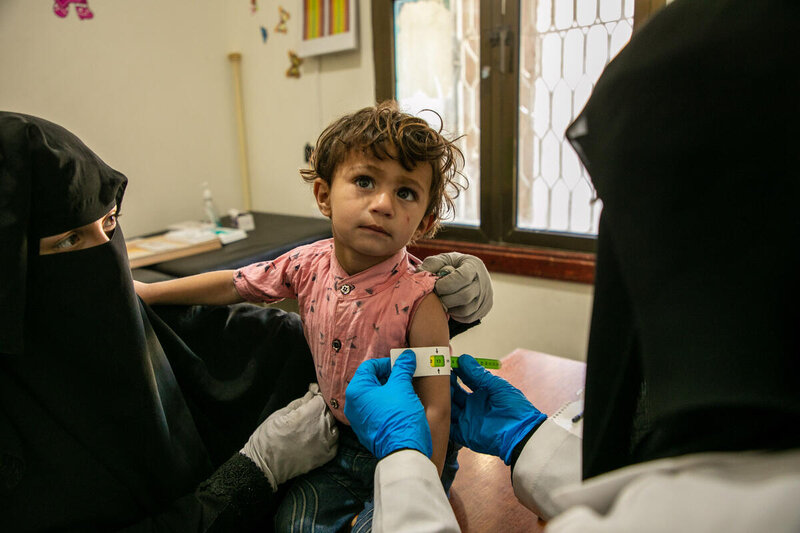Ukraine war: More countries will ‘feel the burn’ as food and energy price rises fuel hunger, warns WFP

The World Food Programme (WFP) is working to minimize the knock-on effects of rising food and energy prices – triggered by the Ukraine conflict – on hunger around the world, while it looks to scale up operations within the country and reach 3.7 million people. “[As] hunger threatens Ukraine directly, the fallout from this war will spread across the globe. Russia and Ukraine together export about 30 percent of the world’s wheat,” said WFP Executive Director David Beasley.

A report just published by WFP warns that the costs of its global operations look set to increase by US$29 million a month. When added to pre-existing increases of US$42 million (since 2019), the total additional costs facing WFP are US$71 million per month.
This could spell disaster for millions, as WFP had already warned that 2022 would be a year of catastrophic hunger, with 44 million people in 38 countries teetering on the edge of famine.
As well as exporting a significant proportion of the world’s wheat, over the past ten years Ukraine has become WFP’s biggest supplier of foods such as sunflower oil.
With Russia being such a huge player in the energy sector, inevitable prices hikes resulting from sanctions on its oil and gas will limit access to food for some of the most vulnerable people in the world, many of whom are already facing super-high inflation, according to the report.
Adding to woes, shipping costs are multiplying with ‘war risk’ insurance premiums of up to US$300,000 for some voyages.
“As the war heats up, dozens of distant countries are set to feel the burn,” Beasley said.

“With our funding levelling off because donor nations’ treasuries are so stretched, we have had to slash rations to refugees and other vulnerable populations across East Africa and the Middle East,” he added. “Halved rations mean hungry children eating the equivalent of just one bowl of cereal each day.”
Places where WFP has had to reduce rations include Yemen, one of the world’s worst hunger crises, where 16.2 million people are food insecure and there are pockets of famine-like conditions.
With Ukrainian ports closed and Russian grain deals on pause because of sanctions, 13.5 million tons of wheat and 16 million tons of maize are currently frozen in Russia and Ukraine, WFP’s report states.
Afghanistan, Ethiopia and Syria are particularly vulnerable to any hold-up on wheat imports, on which millions of people are heavily dependent. These countries, where WFP is running emergency operations, are already reeling from the combined effect of conflict, climate change, the coronavirus pandemic and rising costs.

In the Middle East and North Africa region, higher food and energy prices also spell misery for Lebanon and Yemen, while complications are expected in East Africa, where 84 percent of wheat demand is met by imports.
The report warns of “cancellations or delays of WFP shipments from the port of Odessa” which will “likely primarily affect West Africa,” where the cargo is needed for distributions from May onwards.

Because of scarcity, war, the pandemic’s economic aftershocks and crude oil prices near a 13-year high, WFP is already paying 30 percent more for food than it was in 2019,” said Beasley. “If the Black Sea transport corridors are disrupted further by this burgeoning war, transport prices will spike in lockstep, doubling or even tripling.”
He added: “Very soon, surviving Ukrainian farmers will be trying to seed their spring fields in some of the world’s richest earth, from where WFP had hitherto drawn more than half our wheat.” But the war will likely hinder that.

“If Ukrainian fields lie fallow this year, aid agencies such as ours will be forced to source new markets to compensate for the loss of some of the world’s best wheat. Doing so will come at a vastly inflated cost.
”This week, Beasley visited border towns in Poland where WFP staff are ramping up operations to support the disrupted commercial supply chain inside Ukraine and deliver assistance to over 3 million people. Working with local NGO Tarilka, WFP has already started a 10-day daily distribution of 30,000 loaves of bread in Kharkiv, benefiting 60,000 people, as it seeks to scale up exponentially. WFP has also mobilized a consignment of wheat flour that is being moved by rail to Kyiv.

“Even as humanitarians and governments feed those who make it out, the systems that feed the tens of millions trapped inside Ukraine are falling apart: trucks and trains destroyed, airports bombed, bridges fallen, supermarkets emptied and warehouses drained,” said Beasley.



